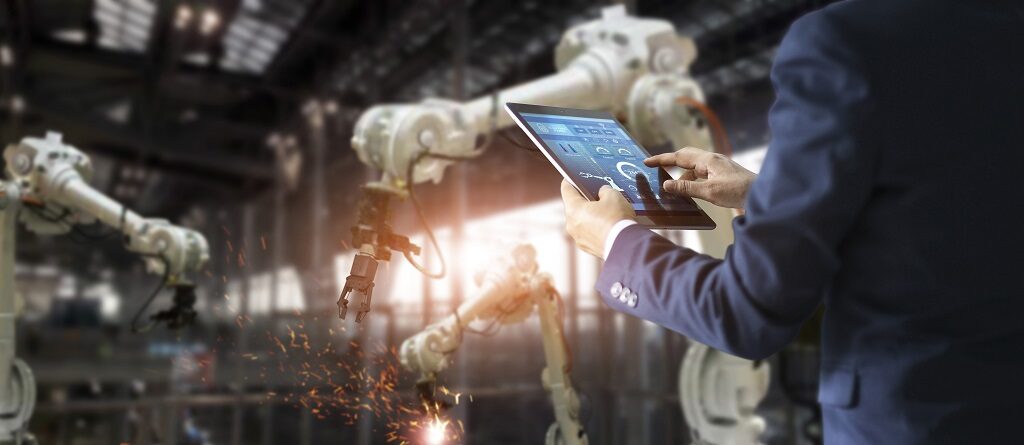So far, unless you work in a few select industries like manufacturing, deep-sea exploration, or a certain cafe in Budapest, chances are you haven’t seen too many robots during working hours (despite your suspicions about Bob from accounts). That’s all about to change.
It’s now a case of when, not if, we’ll be sharing our work spaces with automated colleagues, and it’s likely to be sooner than you think. Much like the increase in AI, which is already having a huge effect across multiple sectors including recruitment, robots are going to be whirring and buzzing their way into a workplace near you in the next few years. This means businesses need to be ready for a drastically different landscape – one that is almost certain to create entirely new jobs, departments, and products.
Robots at Work
Robots have been in the workplace since 1962, when American car manufacturer General Motors first introduced a machine in its factories. Since then, robotics has generally been contained to a few select industries.
In recent years, the precision and reliability that robots can achieve, coupled with the leaps in AI and computing power, means that many more sectors are now starting to benefit from an increasingly automated workforce. Robots are now cropping up at hospitals, warehouses, schools, offices, and yes – cafes in Budapest.
There are still teething problems and limits in capabilities of course – Amazon’s warehouse robots, for example, have been the subject of criticism due to safety concerns. Overall however, we’re starting to reach the point where robots in the workplace are a real, affordable, and highly efficient option; this will be the case even more in the coming years.

Increased Automaton Availability
There are a number of factors that are making robots more affordable. Open source development and relatively cheap sensor technologies, as well as affordable 3-d printing, has meant that the robotics field has progressed very quickly in recent years. Combine this with the fact that computing power has continued to increase exponentially, as well as ongoing advances in voice and object recognition, and the climate is pretty much perfect for a boom in robotics.
One problem with this sudden burst in new technology, however, is the general lack of preparedness and consideration from the wider world. Much like when AI and drone technology sudden broke into the mainstream, society and businesses are on the back foot in terms of ethical, practical, cultural, and workplace implications, for the most part.
Robot Ready?
So what does this all mean for businesses? Opinions are mixed. According to a recent study from the Bank of England, around 15 million jobs could be at risk as a result of automation. A study of firms at the World Economic Forum, meanwhile, found that 54% of employees surveyed would have to retrain or learn new skills in the next three years. A shakeup is certainly on the way, but the major difficulty for businesses is knowing exactly what kind of skills are going to be required.In some historic US studies, the jobs taken by robots have not been replaced. This led to detrimental effects on wages and employment opportunities in the affected areas. Older studies have tended to be limited to manufacturing-focused areas, however, and most of them were conducted before the current technological climate. Historic studies can be taken with a pinch of salt then, but there are real concerns. Even Bill Gates has suggested a robot tax, for example, and South Korea already looks likely to start removing any tax incentives for companies focusing on automation.
Potential problems aren’t entirely limited to businesses of course. Jobseekers currently have no way of knowing what skills they should be learning in order to be attractive candidates in a climate that is increasingly automated. The lack of jobs could also mean an increased need for a comprehensive welfare system or universal basic income – all of which are currently paid for by taxing the human workforce.
The flip side, of course, is that new roles, products, and industries are likely to spring up. This is often the case when new tech becomes available. We can see this is historically true – simply consider the automotive industry or the internet. There are now jobs, products, and consumer demand that didn’t exist previously, and that we had no way of predicting until the technology gained momentum.There’s also some positive research out there. Some studies from the States shows that while regional jobs may be lost, net jobs actually increase. Studies conducted concerning robotics use in China, Brazil, Japan, and India also found that overall, as the implementation of robotics increased, unemployment decreased. Finally, a PWC report into the impacts of robotics found that the increased efficiency and productivity are likely to increase overall wealth generation.
Good or Bad for Business?
While it is essentially impossible to make any concrete predictions about the effects robots will have, businesses are in much more of an advantageous position than they have been during previous technology revolutions. Thanks to machine learning and AI, it’s a lot easier to create models for the future, and that is exactly what some organisations are doing. A number of European companies and government studies are already using these methods to assess what skills might be required – normally surveys would take too long to deliver results, but using AI, it’s now possible for researchers to accurately predict what skills might be needed in the employment sector, and when.Overall then, the best thing businesses can do to prepare themselves is to make use of the technology at hand as much as possible. There is, as pointed out by Gillian Docherty, CEO of The Data Lab, ‘a positive link between jobs, skills and automation.’. Embracing predictive technology that’s available now will allow businesses to be much more responsive to a changing environment. Not only that, it will give employees and potential candidates a headstart when it comes to skilling up for future opportunities.






